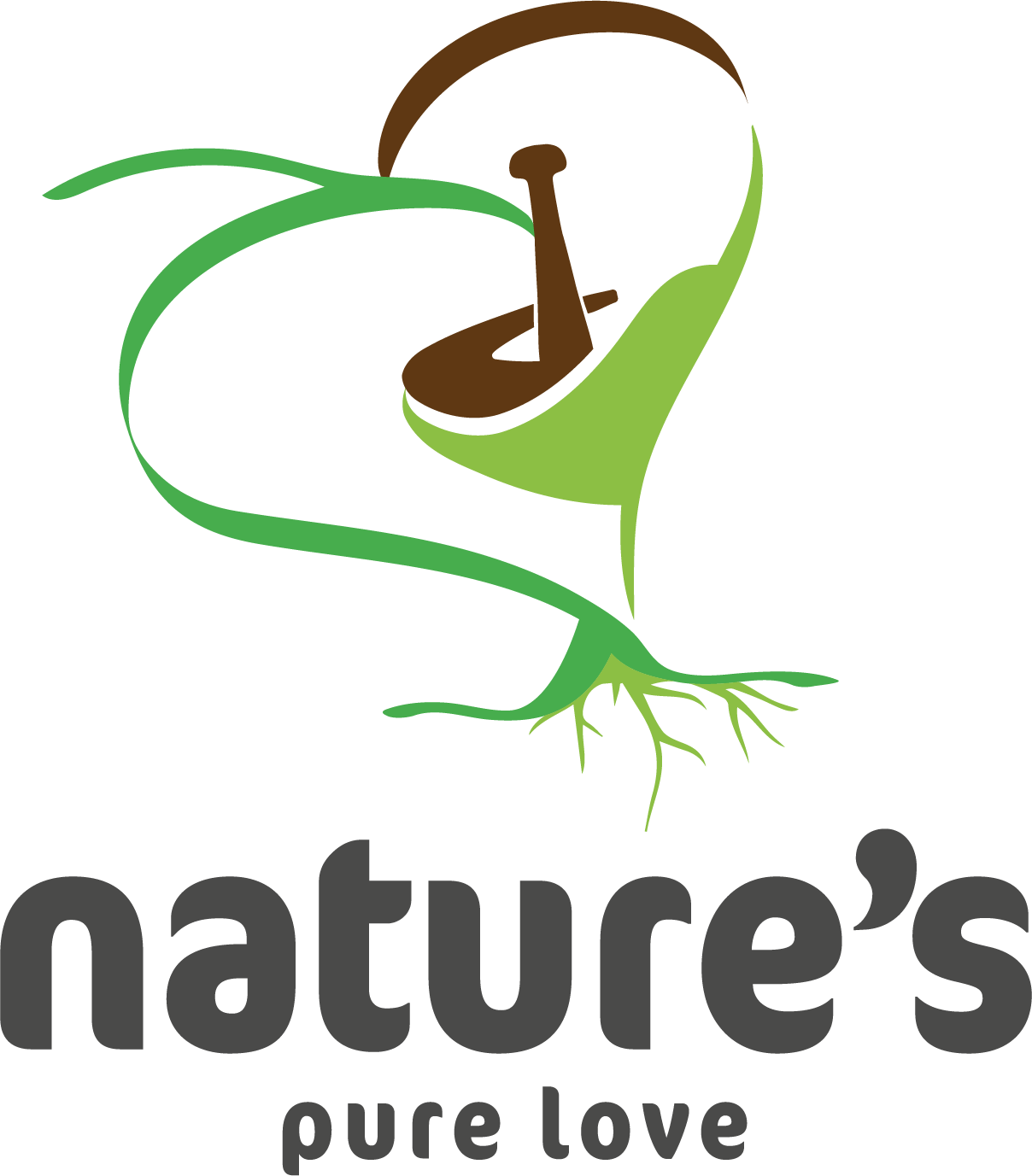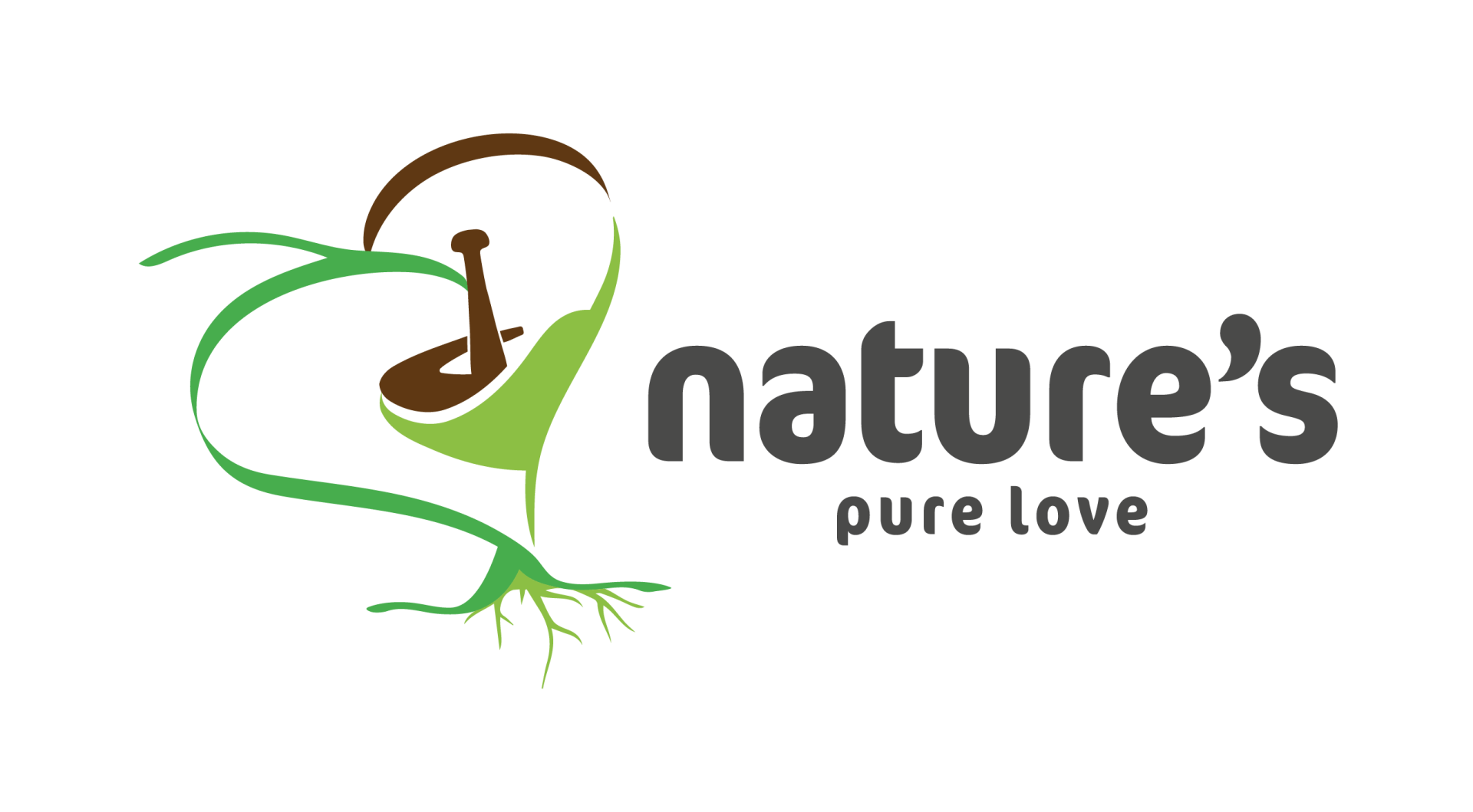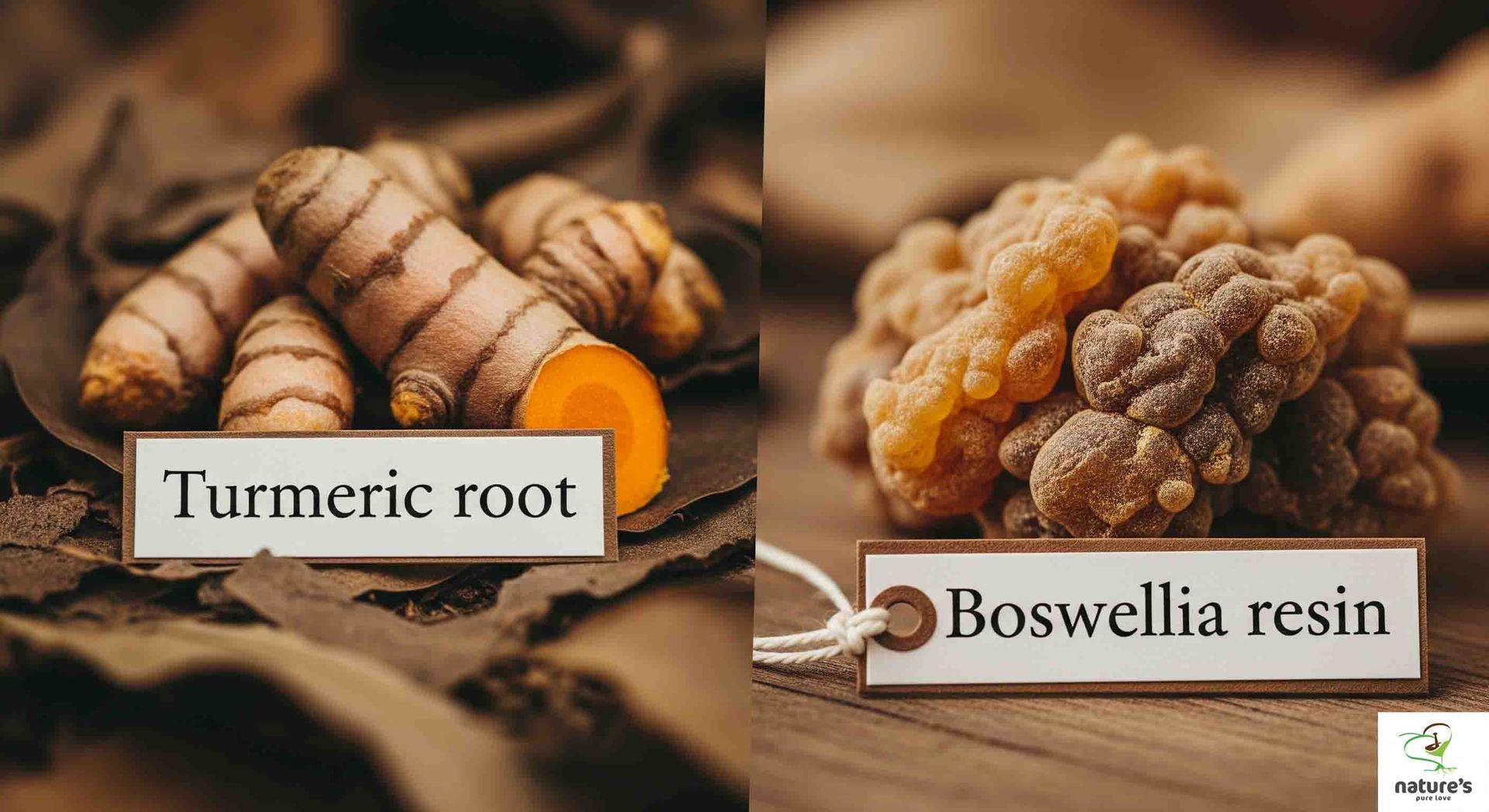Herbal Supplement
Herbal Supplements: A Holistic Guide to Nature’s Remedies
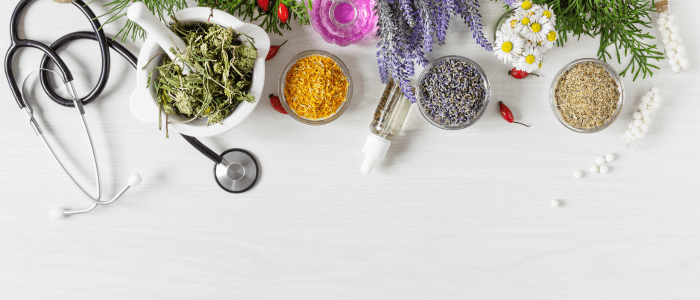
Herbal supplements, made from plant-based sources such as roots, bark, leaves, flowers, and seeds, have been integral to wellness practices for thousands of years. Ancient traditions like Ayurveda, Traditional Chinese Medicine (TCM), African Herbal Cultures, and Native American healing embraced these remedies to nurture physical, emotional, and spiritual health. Today, with an increasing focus on natural and holistic living, herbal supplements are a cornerstone of complementary and alternative medicine (CAM).
When used correctly, guided by qualified professionals and tailored to individual needs, herbal supplements can support various health concerns. This guide explores their types, uses, safety considerations, and practical tips for integrating them into your wellness journey.
What Are Herbal Supplements?
Herbal supplements are products derived from plants to promote health and address specific conditions. Their efficacy often depends on the method of preparation and the concentration of active ingredients.
Common Forms of Herbal Supplements
- Tinctures (Alcohol or Glycerin-Based Extracts):
- Tinctures are concentrated liquid extracts where herbs are steeped in alcohol or glycerin.
- Alcohol-based tinctures are potent and have an extended shelf life, while glycerin-based alternatives are milder and sweeter, ideal for those avoiding alcohol.
- Capsules and Tablets:
- These provide a measured dose of powdered herbs or standardised extracts.
- They are convenient for travel but require digestion before absorption.
- Teas (Infusions and Decoctions):
- Infusions: Created by steeping delicate parts, such as leaves or flowers, in hot water to release lighter constituents.
- Decoctions: Made by simmering tougher parts, like roots or bark, to extract more robust compounds.
- Powdered Concentrates:
- Dried and ground herbs that can be mixed into smoothies or drinks.
- Concentration levels vary, requiring attention to dosing.
- Standardised Extracts:
- Designed to deliver consistent levels of specific active compounds, ensuring predictable effects.
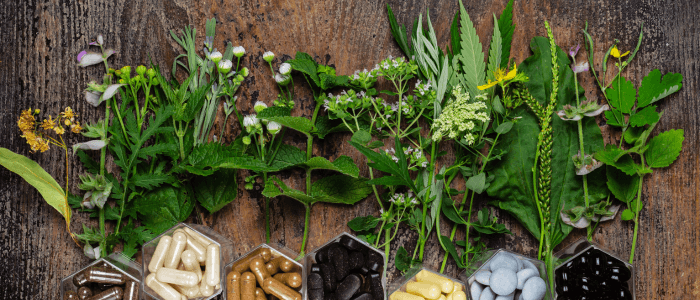
Therapeutic Categories of Herbal Supplements
Herbs serve a broad range of functions, from reducing stress to supporting digestion. Here are some of the most popular categories and their associated herbs:
Adaptogens: Enhancing Stress Resilience
Adaptogens are herbs that support the body in adapting to physical and emotional stress, particularly by influencing the adrenal glands.
- Ashwagandha (Withania somnifera): Aids in stress management, improves sleep, and supports cognitive health.
- Rhodiola (Rhodiola rosea): Boosts energy, enhances mental performance, and helps combat fatigue.
- Holy Basil (Tulsi): Reduces cortisol levels, offering stress relief and immune support.
Immune Support Herbs
These herbs strengthen the immune system, aiding in defence against infections.
- Echinacea: Stimulates immune activity, particularly during colds and flu.
- Elderberry: Fights viruses, reducing the severity and duration of symptoms.
- Astragalus: Promotes immune cell production and has antioxidant properties.
Herbs for Digestive Health
Digestive discomfort can be alleviated using herbs that soothe or stimulate digestion.
- Peppermint (Mentha piperita): Calms the digestive tract, reducing bloating and gas.
- Ginger (Zingiber officinale): Alleviates nausea and promotes gastric emptying.
- Fennel (Foeniculum vulgare): Relieves indigestion with its carminative properties.
Nervous System Support
For calming the mind and enhancing sleep, these herbs are invaluable:
- Valerian (Valeriana officinalis): Encourages restful sleep by influencing GABA levels in the brain.
- Passionflower (Passiflora incarnata): Reduces anxiety and promotes relaxation.
Lemon Balm (Melissa officinalis): Soothes stress and supports restful sleep.
Safety and Quality: Choosing the Right Herbal Supplements

The effectiveness and safety of herbal supplements depend heavily on their quality.
Key Considerations:
- Source and Purity:
- Choose products tested for contaminants like heavy metals and pesticides.
- Look for certifications from reputable organisations such as USP, NSF, or ConsumerLab.
- Standardisation:
- Standardised supplements ensure consistent active ingredient levels, improving reliability.
- Organic Certification:
- Opt for organically sourced products to avoid exposure to harmful chemicals.
- Sustainable Practices:
- Environmentally conscious sourcing ensures the preservation of plant populations and ecosystems.
- Manufacturer Integrity:
- Trust brands that follow Good Manufacturing Practices (GMP).
Safe Use of Herbal Supplements
Herbal supplements, while natural, are not free from risks. Their safe use requires careful consideration of individual needs and potential interactions.
Important Tips:
- Consult a Professional: Always discuss herbal supplements with a healthcare provider, especially if you’re pregnant, breastfeeding, or taking medications.
- Start Small: Begin with the lowest effective dose and adjust gradually as needed.
- Monitor Reactions: Pay attention to your body’s response and seek guidance if any adverse effects occur.
- Consider Timing: Some supplements are best taken with food, while others work better on an empty stomach.
Incorporating Herbal Supplements into Daily Life
Herbal supplements can seamlessly fit into your wellness routine with thoughtful planning.
- Identify Your Needs: Determine whether you’re seeking stress relief, immune support, or digestive aid.
- Choose the Right Form: Select a format that fits your lifestyle, such as capsules for convenience or teas for a calming ritual.
- Follow Dosage Guidelines: Adhere to manufacturer recommendations or expert advice for dosing.
- Combine with Healthy Practices: Pair supplements with a balanced diet, regular exercise, and mindfulness practices for maximum benefit.
The Future of Herbal Medicine
Research continues to unlock new potential uses for herbs, advancing their role in modern wellness. Emerging trends include:
- Improved Extraction Methods: Enhancing bioavailability and potency.
- Sustainability Initiatives: Supporting ethical harvesting and cultivation practices.
- Integration with Modern Medicine: Increasing collaboration between conventional and holistic practitioners.
Final Thoughts
Herbal supplements are powerful allies in your journey to wellness, offering nature’s wisdom in accessible forms. By choosing high-quality products, consulting knowledgeable professionals, and embracing a holistic lifestyle, you can harness the potential of these remedies.
At Nature’s Pure Love, we are committed to guiding you through your wellness journey with care, nurture, and empowerment. Let us help you discover the benefits of holistic health and reclaim your vitality naturally.
For personalised guidance, contact our specialists today and take the first step towards a healthier, balanced life.
Frequently Asked Questions (FAQs)
Q. What are herbal supplements?
Herbal supplements are natural products made from plant-based materials such as leaves, roots, flowers, or seeds.
They are used to support health and wellness, often as part of a holistic approach to addressing physical, mental, or emotional needs.
Q. Are herbal supplements safe to use?
When used appropriately and under the guidance of a qualified healthcare professional, herbal supplements are generally safe.
However, it’s essential to ensure they are sourced from reputable manufacturers and to consider potential interactions with medications or existing health conditions.
Q. How do I choose the right herbal supplement for my needs?
Begin by identifying your specific health goals. Consult a healthcare provider or herbalist to determine which herbs may benefit you and what dosage is appropriate.
Always select high-quality products that are organic, standardised, and tested for purity.
Q. Can I take herbal supplements alongside prescription medications?
Some herbal supplements may interact with prescription medications, either enhancing or reducing their effects.
It is crucial to discuss any herbal supplement use with your doctor to avoid adverse interactions.
Q. What forms do herbal supplements come in?
Herbal supplements are available in various forms, including tinctures, capsules, teas, powdered concentrates, and standardised extracts.
The form you choose depends on your preference and the specific needs of your body.
Q. How long does it take to see results from herbal supplements?
The timeframe for seeing results varies depending on the herb, the condition being addressed, and individual factors.
Some effects, such as relaxation from calming herbs, may be immediate, while others, like immune support, may take several weeks of consistent use.
Q. Are herbal supplements suitable for children and pregnant women?
Not all herbal supplements are safe for children or pregnant women.
It is essential to seek advice from a qualified healthcare provider before using herbal supplements in these cases.
What are adaptogens, and how do they help?
Adaptogens are a category of herbs, such as ashwagandha and holy basil, that help the body manage stress and restore balance.
They support the adrenal glands and improve resilience to physical, emotional, and environmental stressors.
Q. Can herbal supplements improve digestion?
Yes, certain herbs like peppermint, ginger, and fennel are known to aid digestion.
They can help alleviate bloating, nausea, and other digestive discomforts.
Citations:
What Are Herbal Supplements?
- NHS - Herbal Remedies: Provides an overview of herbal remedies, their uses, and safety considerations. NHS
Common Forms of Herbal Supplements
- Herbal Medicine Research: A comprehensive guide on various forms of herbal supplements and their preparation methods. Herbal Medicine Research
Safety and Quality: Choosing the Right Herbal Supplements
- Medicines and Healthcare products Regulatory Agency (MHRA): Guidelines on the regulation of herbal medicines in the UK. MHRA
